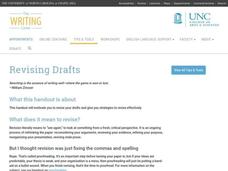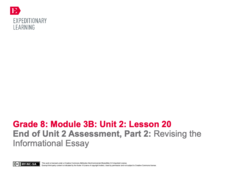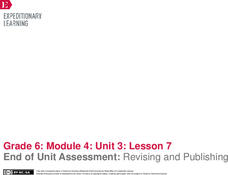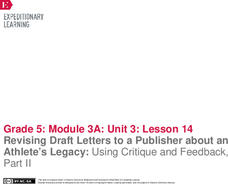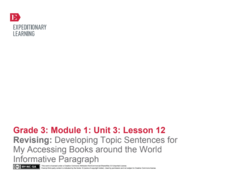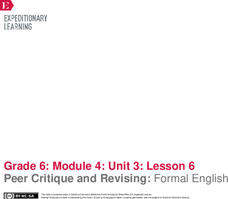University of North Carolina
Revising Drafts
Don't simply proofread ... revise instead! Revising drafts is the topic of the 17th handout in UNC's Writing the Paper series of 24 lessons. Writers discover the importance of revision, as well as steps to follow during the process.
Curated OER
Revisiting Writing through Revision
Strategies to teach and motivate your students to revise their writing.
Curated OER
Revision Checklist for the Accordion Essay
Encourage your class to revise their writing and check over their work by requiring them to complete an organization checklist. The checklist, created specifically for a accordion-style essay, asks writers to look over their formatting,...
Curated OER
Revision Techniques for Writing
How can you help your class improve their writing? Start by showing a student example on the overhead. Read through the paragraph in a think-aloud format, commenting on areas that need improvement. Then, as a class, work together to make...
EngageNY
Revising Draft Letters to a Publisher about an Athlete’s Legacy: Critique and Feedback, Part I
Pick a corner, any corner! Pupils use the Four Corners strategy and Peer Critique protocol to assess one another's draft letters to a publisher about an athlete's legacy. Scholars then use peer feedback to revise their letters.
Curated OER
Proofreading, Revising, & Editing Skills Success
Some self-paced writing resources are just better than others. This one is great. The 205-page packet includes exercises on every aspect of the writing process, from crafting sentences and paragraphs, to proofreading, revising, and...
EngageNY
Writing, Critique, and Revising: Two-Voice Poems (Chapter 14: "Las Ucas/Grapes")
Continue work on the two-piece poem that compares two characters from Esperanza Rising. Give class members a few minutes to finish their drafts. After they have a complete product, model how to critique and edit the poems with one group....
EngageNY
End of Unit 2 Assessment, Part 2: Revising the Informational Essay
Writers look at the End of Unit 2 Assessment: Best First Draft of an Informational Essay handout and use sticky notes to identify things in their work that need editing and revising. They reference their notes to finalize their...
EngageNY
End of Unit Assessment, Part 1, Continued: Revising Vocabulary and Conventions Based on Feedback
Writers align their position papers with the last two rows in the rubric. After looking at the rubric rows for vocabulary and conventions along with feedback on their papers, class members revise their essays. They then look at the...
EngageNY
End of Unit Assessment: Revising and Publishing
Dictionaries, thesauruses, word walls, oh my! Pupils use several resources to revise their position papers to include appropriate vocabulary. Then, after peer editing, scholars write the final drafts of their essays and self-assess using...
EngageNY
Revising Draft Letters to a Publisher about an Athlete’s Legacy: Using Critique and Feedback, Part II
Let's get opinionated. Scholars participate in a peer critique and revision process using a fun activity called a Four Corners strategy. After incorporating classmates' feedback, individuals share their final drafts of their opinion...
Curated OER
Write Right!
After watching part of a Club Write Kids video and discussing the editing process, each group of learners writes a letter to a favorite author. They ask for a copy of a page of manuscript that has gone through the editing process. Prior...
EngageNY
Writing Dialogue: Revising Historical Narrative Drafts to Add Dialogue
Young writers have written, revised, and peer-edited their historical fiction narratives by the 10th lesson plan in a language arts unit. Fourth graders finally combine their revision notes to create a second draft. The double-spaced...
K20 LEARN
Writing Wrongs Mini Lesson: Peer Editing And Revising
High schoolers draft a paragraph about their stance on the issue of school uniforms and share their work with a peer for editing. After watching a parody video about peer editing and revising, class members generate a "Top 10 list" of...
EngageNY
End of Unit Assessment, Part 1: Revising Claims and Evidence Based on Feedback
Revisit, revise. Scholars receive their position papers returned with feedback from the teacher. They use colored pens to identify feedback related to the first two rows of the rubric and correct their papers based on the comments....
EngageNY
Revising: Developing Topic Sentences for My Accessing Books Around the World Informative Paragraph
Revision is an important part of the writing process. Focus on revising topic sentences and details with the plan described here. This is part of a unit, so pupils have already filled out a graphic organizer about traveling libraries...
EngageNY
Peer Critique and Revision: Storyboard, Sections 1-4
Teamwork makes the dream work. Pupils participate in a peer critique process, using forms to offer constructive advice about each other's storyboards. Next, scholars revise their storyboards based on the feedback, and then share their...
EngageNY
Revising: Strong Conclusions for My Accessing Books Around the World Informative Paragraph
It's important that writers leave their readers with a strong and satisfying conclusion. Help your young writers develop the skills to compose a concluding sentence with the steps outlined here. After class members have had a chance to...
EngageNY
Revising My Accessing Books Around the World Informative Paragraph for a Hook to Captivate My Reader
While this is considered optional within the unit it is designed for, pupils would benefit from the listed activities. Working on writing and revising a paragraph about librarians who travel to isolated areas, class members can add some...
EngageNY
Storyboard Revision: Managing the Sequence of Events and Using Sensory Details
Mastering techniques from the resource, pupils give life to their writing, revising their storyboards to include sensory details and transitions. To finish, they participate in a peer critique process and use the feedback to further...
EngageNY
Peer Critique and Revising: Formal English
Dear Sir or Madam: What's the difference between formal and informal language? Scholars focus on using formal English and transitions in their position papers. After revising their rough drafts, they engage in the peer editing process...
EngageNY
Performance Task Preparation: Peer Critique and Mini-Lesson Addressing Common Errors: Revising Draft Essay to Inform
Time to revise! Using a writing evaluation rubric, scholars participate in a peer editing process to provide feedback on each others' informative essays. Next, pupils begin revising their drafts based on the feedback they receive.
Curated OER
Writing Process-- Revision and Editing
As guided practice, class members work together to revise a model persuasive paragraph. Then they practice independently with their own writing. The included rubric looks at prewriting, drafting, revising, editing, nonfiction text...
K12 Reader
Revise Your Writing
The importance of revising writing is the focus of a short reading comprehension worksheet that asks readers to respond to a series of questions based on the article.


